The Chromebook Pixel (2015) Review
by Brandon Chester on March 16, 2015 8:00 AM EST- Posted in
- Laptops
- Chrome OS
- Chromebook
- Chromebook Pixel
CPU Performance
Chrome OS is extremely lightweight, which makes sense for an operating system that has to run on processors that range from Intel's Core i7 at the high end, to Intel Atom and ARM processors at the low end. Most devices running Chrome OS are closer to that lower end, and that coupled with the web application nature of Chrome OS doesn't make it a large target for benchmark developers. The situation is arguably even worse than mobile benchmarking since the only benchmarks a device can be tested in are web benchmarks, but we have to work with what we have. The new Chromebook Pixel is powered by Intel's Core i5-5200U processor, which is one of Intel's new Broadwell-U parts.
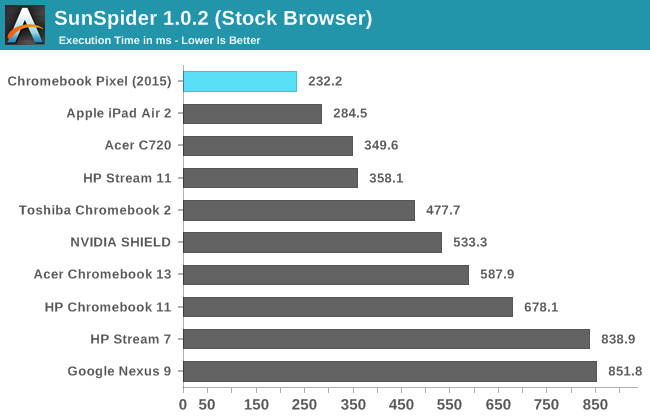
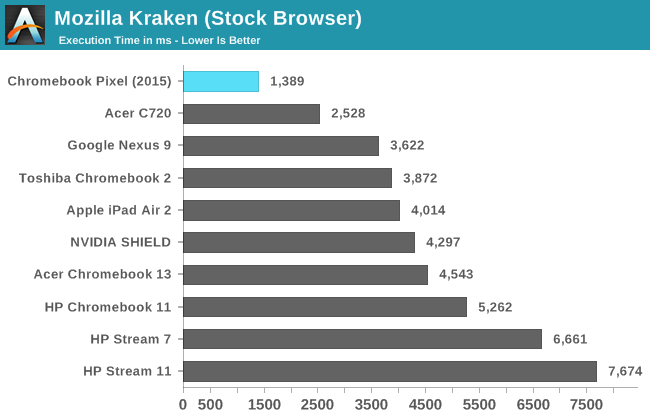
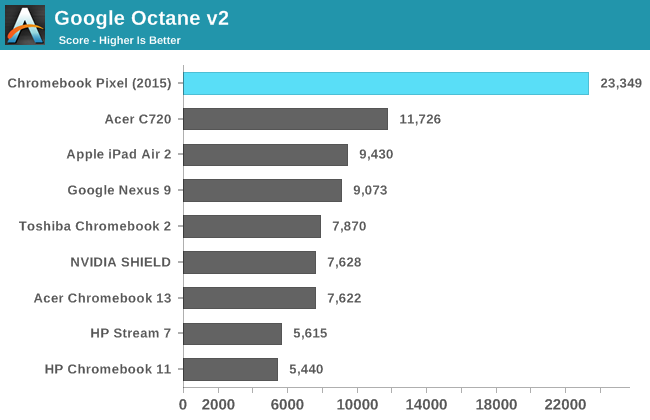
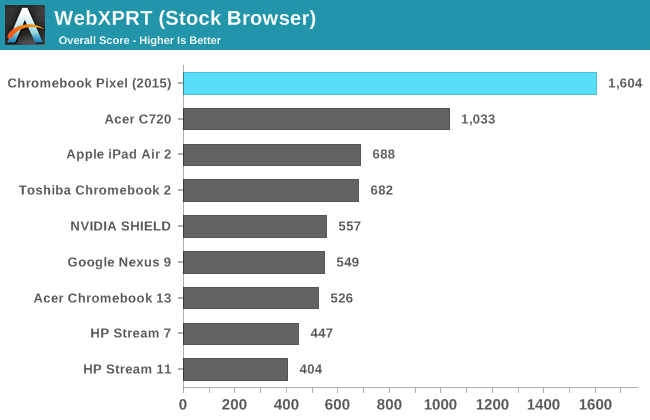
| Additional Performance Results | ||||
| Acer C720 | Acer CB13 | Toshiba Chromebook 2 | Chromebook Pixel (2015) | |
| CrXPRT | 96 | 55 | 61 | 161 |
| Spacerocks (WebGL - FPS) | 18 | 30 | 11 | 45 |
The CPU performance of the original Pixel could be described as completely overkill for running Chrome OS, and the same is true for this year's iteration. The Pixel gives you whats is undoubtedly the smoothest and fastest Google Chrome experience available. While I find the performance of an Intel i5 to be unnecessary to do something as simple as run Chrome and web apps, it definitely comes in handy if you're running some other version of Linux overtop of Chrome OS.
WiFi Performance
The 2013 Chromebook Pixel had dual spatial stream 802.11n WiFi and Bluetooth 3.0. In early 2013, this was fairly common among laptops, although 802.11ac adoption on high end laptops began not long after. The 2015 Chromebook Pixel uses Intel's Intel 7260 WiFi + BT 4.0 module, with 2x2 802.11ac support. This brings the max theoretical WiFi speed up to 866Mbps, a substantial improvement over the 300Mbps max on the 2013 model. Real world performance will almost always be lower than theoretical maximums, and to test WiFi performance I've used iPerf to get an idea of what the maximum throughput is on the Pixel.
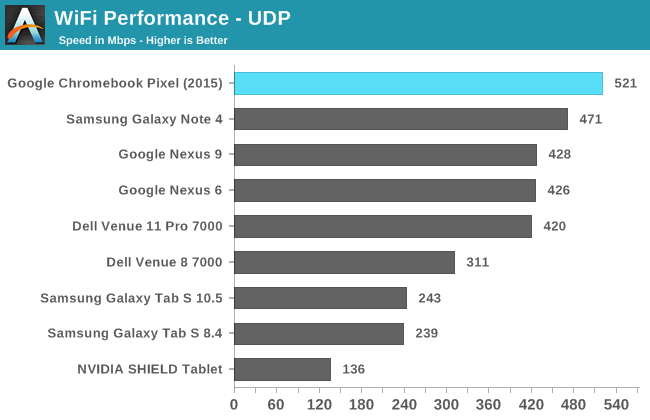
In most of our tests I've compared the Pixel to other Chromebooks, tablets, and smartphones. This is mostly due to the previously mentioned benchmarking limitations on Chrome OS. To keep consistent with this, and to avoid making unfair comparisons to laptops which aren't tested using iPerf, I've just run the Pixel through our smartphone/tablet WiFi benchmark. This still gives an idea of how fast the Pixel is, without comparing it to other laptops that were not tested in the exact same manner.










123 Comments
View All Comments
steven75 - Wednesday, March 18, 2015 - link
The problem is this is a barely-higher-than Corolla quality device at a non-Corolla price.whatsa - Monday, March 16, 2015 - link
A chrome os dev would be smarter to buy the cheap one to do performamnce testing.sorten - Tuesday, March 17, 2015 - link
Exactly. This would be the worst choice for dev or testing. For dev you want a real OS and a CPU with a larger TDP envelope for quick builds and for testing you want a piece of crap for testing the worst case scenario.jabber - Wednesday, March 18, 2015 - link
If you are a serious ChromeOS developer and can buy the Pixel then you can afford $250 for a standard Chromebook for testing too. To be honest development is a business of sorts. If you can't afford a couple of thousand dollars for hardware/software costs then maybe look to do something else. Annoys me when people setup in business or run a business and then baulk at spending say $200 on software that will enable them to potentially make $200000.NeatOman - Monday, March 16, 2015 - link
The only thing that seperates this from another $1000+ laptop is storage which google doesn't want you to have because they want these type of machines to be cloud/service driven as this is the pinnacle of an internet driven OS. A lot of people bought the first Chrome Pixel and simply replaced the ssd with a much larger one.tyger11 - Monday, March 16, 2015 - link
I thought the original Chrome Pixel had its SSD soldered in, so I doubt 'many' - or even ANY - replaced the SSD.retrospooty - Monday, March 16, 2015 - link
Yeah, I never got this product. The Chromebook, by definition is a low end internet appliance. This is a high end low end well-speced device with no need or use for it's specs. Core i7 and 16gb RAM on the high end ? WHY?More importantly you are spending $1000+ on a laptop , why on earth would you buy a chromebook?
BrandonVillatuya - Tuesday, September 15, 2015 - link
Oh sure the specs aren't the highest specs. But the point IS that it's a chromebook. It gets no viruses, it will outperform anything with the same specs including macbooks when it comes to the web, it has the fastest bootup times of any computer etc. The battery life is also hours better than similar priced macbooks and PCs. You are paying for what you aren't getting. For people who don't do much but surf the web, type documents, or any of the basic functions, it becomes worth the money as a long term investment. On top of that chrome os is growing in functionality at an extremely fast rate. I have a PC laptop, but I don't do heavy photo or video editing. Literally when I don't have WiFi my laptop is just as useless to me as a chromebook.damianrobertjones - Monday, March 16, 2015 - link
"and the rest of its specs were also impressive."32Gb of storage space. There's a limit to what we'll believe.
lilmoe - Monday, March 16, 2015 - link
32GB on a laptop this expensive is just..................offensive.Side note: Microsoft needs to make a Surface Laptop. I'd be all over that. Surface Pro3 is the best tablet ever, yes, but it isn't as practical in most of MY use cases.
A Surface Laptop (with a touch screen) and a Galaxy S6 running Windows 10 would be reallllly nice.